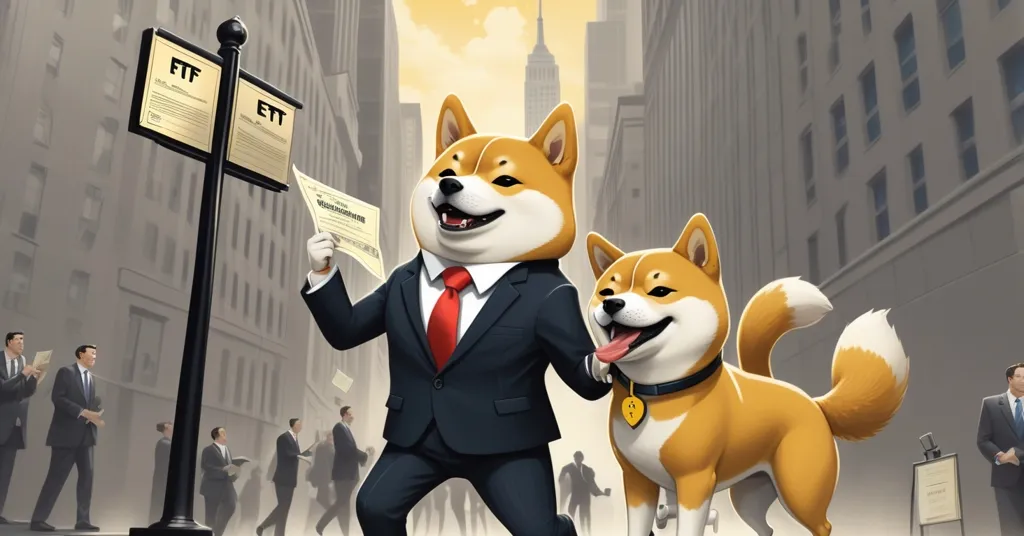Dogecoin ETF Gains DTCC Listing, But SEC Approval Still Looms as Major Hurdle

Dogecoin ETF Update: DTCC Listing Signals Progress, But SEC Approval Remains the Final Hurdle
A meme coin that started as an internet jest might just be on the cusp of Wall Street respectability. Swiss asset manager 21Shares has taken a bold step with its proposed Dogecoin ETF, under the ticker TDOG, securing a listing on the Depository Trust & Clearing Corporation (DTCC) platform in the U.S. This move marks a significant milestone toward potential trading, but the ultimate gatekeeper—the U.S. Securities and Exchange Commission (SEC)—still holds the keys to its fate.
- DTCC Milestone: 21Shares’ Dogecoin ETF (TDOG) is listed on DTCC under “Active and Pre-Launch,” preparing the groundwork for trading.
- SEC Roadblock: Regulatory approval from the SEC is still pending, with no clear timeline for a decision.
- Market Implications: If approved, this ETF could elevate Dogecoin’s credibility and provide regulated exposure for investors.
From Meme to Market: Dogecoin’s Unlikely Rise
For those unfamiliar, Dogecoin began in 2013 as a tongue-in-cheek parody of Bitcoin, complete with a Shiba Inu dog as its mascot. Created by two software engineers as a joke, it was meant to mock the speculative frenzy around cryptocurrencies. Fast forward a decade, and this underdog coin has amassed a massive following, fueled by viral internet culture, celebrity endorsements—yes, Elon Musk, we’re looking at you—and jaw-dropping price surges. Its market cap has at times soared into the billions, often driven by social media hype rather than any deep technological innovation. Now, with a spot ETF in the works, Dogecoin is knocking on the door of traditional finance, a glow-up no one saw coming.
But let’s ground ourselves in what this ETF push means. A spot ETF, or exchange-traded fund, directly holds the underlying asset—in this case, Dogecoin—so its price mirrors the coin’s real-time market value. This differs from futures-based ETFs, which speculate on price movements through contracts without owning the actual cryptocurrency. If launched, TDOG would allow investors to gain exposure to Dogecoin without the hassle of setting up crypto wallets or navigating often sketchy exchanges. It’s a bridge between the Wild West of crypto and the regulated realm of Wall Street.
DTCC Listing: A Step Forward, Not a Done Deal
The DTCC listing is a critical yet preliminary move. Think of the DTCC as the engine room of Wall Street, handling the behind-the-scenes logistics of securities trading. When a product like TDOG appears under their “Active and Pre-Launch” category, it signals that broker-dealers are setting up the infrastructure—tickers, clearing processes, and other operational nuts and bolts—to prepare for potential trading. It’s a green light from the backstage crew, but not from the director. Historically, similar listings preceded the launch of spot Bitcoin ETFs in January 2024 and Ethereum ETFs in May of the same year, both of which marked turning points for crypto’s mainstream acceptance. Yet, those approvals hinged on separate regulatory nods, and Dogecoin’s path is no different. For more on this significant step, check out the latest update on the Dogecoin ETF listing on DTCC.
This step doesn’t mean the ETF is ready to trade tomorrow. It’s a procedural checkbox, not a guarantee. The real hurdle—and the one that could make or break this venture—is approval from the SEC, a process notorious for its unpredictability and rigorous scrutiny, especially when it comes to volatile assets like cryptocurrencies.
SEC’s Hard Line: Why Dogecoin Faces an Uphill Battle
The SEC isn’t exactly rolling out the red carpet for crypto products. Tasked with protecting investors and ensuring market stability, the commission has a track record of delaying or outright rejecting crypto ETF filings due to concerns over volatility, market manipulation, and fraud. Bitcoin ETF proposals were shot down repeatedly for years before finally gaining approval in 2024, often citing the same risks. Ethereum faced similar pushback until its spot ETFs were greenlit. Dogecoin, with its meme-driven price swings and lack of a clear use case compared to Bitcoin’s “digital gold” narrative or Ethereum’s smart contract capabilities, presents an even tougher case to argue.
The SEC has already delayed its decision on 21Shares’ filing, requesting more time to assess compliance with Nasdaq listing rules and broader investor protection standards. Dogecoin’s unlimited supply—unlike Bitcoin’s capped 21 million coins—means there’s no scarcity to underpin long-term value, a fact regulators might view skeptically. Add to that its history of extreme volatility (a 2021 spike saw it rise over 8,000% before crashing hard) and the broader crypto market’s reputation for scams, and you’ve got a recipe for regulatory hesitation. No one can predict when—or if—the SEC will make a call, but history suggests it won’t be a quick “yes.”
Not Just 21Shares: The Dogecoin ETF Race Heats Up
21Shares isn’t the only player betting on Dogecoin’s potential. Grayscale, a titan in the crypto investment space known for its Bitcoin and Ethereum trusts, has also filed for a spot Dogecoin ETF, signaling that institutional interest isn’t a one-off fluke. On another front, Rex-Osprey recently launched a hybrid Dogecoin ETF, which blends direct holdings with other financial instruments like derivatives for a different risk profile. Reports indicate it saw strong trading volume on debut, hinting at genuine demand for regulated Dogecoin exposure. For clarity, while a spot ETF like TDOG owns the actual coin, a hybrid product might mix ownership with bets on price movements, offering a varied approach to investment.
This flurry of activity paints a surprising picture: a coin once dismissed as a joke is becoming a serious contender in the eyes of financial heavyweights. Whether this is a sign of maturing markets or just speculative mania in a new wrapper remains to be seen, but the trend is undeniable. Dogecoin is no longer just a punchline—it’s a market force.
Bull Case: Dogecoin’s Shot at Redefining Finance
As someone who champions decentralization and financial freedom, I can’t help but root for this Shiba Inu-led rebellion. Dogecoin’s journey from internet meme to potential ETF embodies the disruptive spirit of crypto—a middle finger to the stodgy, centralized systems that gatekeep wealth. If TDOG gets approved, it could onboard countless new investors into the crypto space through a regulated, accessible product. No need for tech-savvy setups or offshore exchanges; just buy shares through your brokerage account. Dogecoin’s brand recognition, bolstered by a fiercely loyal community and high-profile backers like Elon Musk, gives it a unique edge in capturing mainstream attention. It has also seen real-world use in niche areas like online tipping and charity drives, showing flickers of utility beyond pure speculation.
Moreover, success for Dogecoin could pave the way for other altcoins and meme coins—think Shiba Inu or even more obscure tokens—to enter regulated markets via ETFs. It’s a democratizing move, giving everyday folks a seat at the financial table without needing to navigate the murkier corners of crypto. In the spirit of effective accelerationism, pushing these boundaries faster, even with a coin as quirky as Dogecoin, might just speed up the broader adoption of decentralized technologies.
Bear Case: A Meme Coin Wrapped in Regulation Still Bites
Now, let’s flip the coin and play devil’s advocate with some harsh truths. Even if the SEC approves TDOG, an ETF doesn’t magically erase Dogecoin’s fundamental flaws. Unlike Bitcoin, which offers a decentralized store of value with a finite supply, or Ethereum, which powers a sprawling ecosystem of smart contracts and decentralized apps, Dogecoin’s value is almost entirely tied to hype. Its price often moves on a tweet or a Reddit thread, not on technological merit. With over 140 billion coins in circulation and 10,000 new ones mined every minute, there’s no scarcity to anchor long-term stability—something investors, even in a regulated ETF, can’t ignore.
Let’s look at hard numbers: Dogecoin’s price has swung wildly, peaking at nearly $0.74 in May 2021 during a Musk-fueled frenzy, only to crater below $0.10 by mid-2022. As of late 2023, its market cap hovers around $20 billion, a drop from its highs, with daily trading volume often reflecting speculative bursts rather than sustained interest. Even wrapped in an ETF, this volatility poses real risks. And while 21Shares and Grayscale are credible names, the crypto space’s broader reputation for rug pulls and scams doesn’t vanish with regulation. Is this ETF push a genuine step toward legitimacy, or is crypto jumping the shark by slapping a Wall Street label on a meme?
From a Bitcoin maximalist lens, I’ll admit a bit of skepticism. Bitcoin’s ETF success was built on years of proving its resilience and utility as digital money. Dogecoin, by contrast, feels like a sideshow—fun for onboarding newbies with its low entry price and meme appeal, but lacking the gravitas to rival BTC. Still, I’ll concede it fills a niche: a cultural gateway to crypto that Bitcoin, with its serious tone, can’t match. The question is whether that niche justifies regulated investment vehicles or just fuels speculative bubbles.
Broader Implications: What’s at Stake for Crypto?
Beyond Dogecoin, the outcome of this ETF saga could ripple across the altcoin landscape. If TDOG succeeds, expect a wave of filings for other niche coins, from Shiba Inu to lesser-known tokens, each vying for a slice of regulated exposure. But regulatory skepticism and market saturation might cap such trends—after all, how many meme coin ETFs can Wall Street stomach before it cries “enough”? Globally, the U.S. isn’t the only player; countries like Canada and regions in Europe have shown more openness to crypto products, including ETFs for altcoins. If the SEC drags its feet or denies TDOG, it could push capital and innovation overseas, denting America’s edge in this financial revolution.
Investor profiles for a Dogecoin ETF are another angle to chew on. Are we talking retail traders chasing the next “to the moon” pump, or institutional players hedging with a small, quirky allocation? The mix will shape market dynamics—retail dominance could amplify volatility, while institutional buying might stabilize prices, at least temporarily. Either way, Dogecoin’s blockchain itself, while fast and cheap for transactions compared to Bitcoin, lacks standout features or robust security upgrades, which could undermine long-term confidence if ETF-driven demand exposes technical limits.
What’s Next for Dogecoin ETFs?
The road ahead is murky. The SEC’s decision could come in weeks, months, or never—past crypto ETF delays spanned years, though recent political and market pressures (like Bitcoin’s 2024 approval after intense lobbying) might nudge things faster. If approved, expect an initial surge of interest in TDOG, potentially lifting Dogecoin’s price short-term as investors pile in. But sustained growth hinges on whether the coin can evolve beyond a meme into something with tangible value. If rejected, 21Shares and others might pivot to friendlier jurisdictions, or Dogecoin could fade back into the meme-coin shadows, a cautionary tale of hype over substance.
We’re not here to shill or peddle “moonshot” fantasies. Dogecoin, ETF or not, remains a high-risk gamble on a volatile asset with shaky fundamentals. As much as I cheer for disruption and decentralization, I’m equally committed to cutting through the noise. This isn’t your ticket to instant riches; it’s a speculative bet in a regulated suit. Keep your wits sharp, do your homework, and don’t stake more than you can lose on a dog meme—no matter how cute it looks. Could a joke coin redefine finance, or are we just barking up the wrong tree?
Key Questions on Dogecoin ETF Developments
- What does the DTCC listing mean for Dogecoin’s ETF prospects?
It’s a vital preparatory step, setting up the trading infrastructure like tickers and clearing systems, but it’s no guarantee of launch without SEC approval. - Why is SEC approval the biggest obstacle for the Dogecoin ETF (TDOG)?
The SEC focuses on investor protection and market stability, often delaying or rejecting crypto products due to risks of volatility and manipulation, especially for a meme-based coin like Dogecoin. - How could a Dogecoin ETF impact cryptocurrency adoption?
Approval might draw mainstream investors into crypto through a regulated vehicle, enhancing Dogecoin’s legitimacy and potentially opening doors for other altcoin ETFs. - What sets Dogecoin apart from Bitcoin or Ethereum in ETF consideration?
Unlike Bitcoin’s store-of-value appeal or Ethereum’s smart contract utility, Dogecoin’s value stems from community hype and viral traction, raising red flags for regulators. - What risks should investors weigh with a potential Dogecoin ETF?
Dogecoin’s wild price swings, unlimited supply, and lack of core use cases pose significant risks, even within a regulated ETF framework. - Could other meme coins follow Dogecoin’s ETF path?
Success for Dogecoin might inspire filings for coins like Shiba Inu, but regulatory doubts and market overcrowding could limit such a trend.



